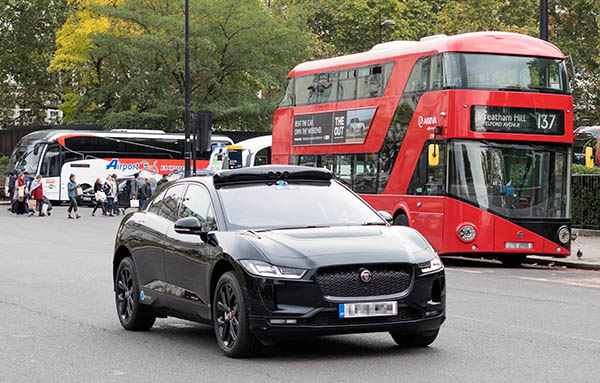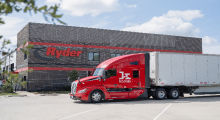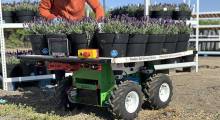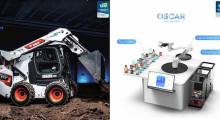Artificial intelligence and autonomous vehicles are just beginning to scale for global deployments. Wayve Technologies Ltd. yesterday announced that it has raised $200 million in Series B funding. The London-based startup said the investment will help it improve the accessibility of self-driving vehicles, allowing more businesses and individuals to benefit from safer, sustainable, and more reliable forms of transportation.
“We were the first team to develop the scientific breakthroughs in deep learning to build autonomous driving technology that can easily scale to new markets using a data-learned approach,” said Alex Kendall, co-founder and CEO of Wayve. “Today, we have all of the pieces in place to take what we have pioneered and drive 'AV2.0' forward.”
“We have brought together world-class strategic partners in transportation, grocery delivery, and compute, along with the best capital resources to scale our core autonomy platform, trial products with our commercial fleet partners, and build the infrastructure to scale AV2.0 globally,” he said.
Founded in 2017, Wayve said it “is on a mission to reimagine autonomous mobility through embodied intelligence.” The company said it was the first to deploy autonomous vehicles on public roads in the U.K. with “end-to-end deep learning.”
Wayve said AV2.0 is “a next-generation autonomous driving system that can quickly and safely adapt to new driving domains anywhere in the world.”
Wayve builds AV2.0 for commercial scale
The typical approach to self-driving vehicles relies on an expensive and complex array of sensors and is operationally limited by the need for high-definition maps and rules-based control strategies, according to Wayve.
The company said its scalable platform uses machine learning to adapt to new cities, different use cases, and varied vehicle types. This allows for commercial deployments to scale more quickly, it added.
Wayve said it has designed its AV2.0 technology to be the most adaptable autonomous vehicle system for fleet operators. It combines a camera-first sensing suite with the embodied intelligence of a deep learning system that continually learns from petabyte-scale driving data provided by partners including Ocado Group, Asda, and DPD.
The company said it will use the new capital to continue to grow its team, develop an SAE Level 4 prototype for electric passenger vehicles and delivery vans, and begin last-mile delivery pilots with partners.
Wayve also plans to develop the data infrastructure to improve its core autonomy platform at fleet scale. The company said it is aiming to be the first to deploy autonomy in 100 cities.
Microsoft joins funding round
Wayve said it has raised more than $258 million in equity to date, and industry observers speculated about whether it has reached “unicorn” status, or $1 billion valuation.
Eclipse Ventures led Wayve's Series B round, with participation from new investors including D1 Capital Partners, Baillie Gifford, Moore Strategic Ventures LLC, and Linse Capital. Microsoft and Virgin provided additional support, as did early-stage investors Compound and Balderton Capital.
They joined strategic investor and online grocer Ocado Group and angel investors including AI and industry leaders such as Sir Richard Branson, Rosemary Leith, Linda Levinson, David Richter, Pieter Abbeel, and Yann LeCun.
“As the industry struggles to solve self-driving with traditional robotics, it is becoming increasingly clear that AV2.0 is the right pathway to build a scalable driving intelligence that can help commercial fleet operators deploy autonomy faster,” said Seth Winterroth, a partner at Eclipse Ventures. “Wayve is breaking new ground by building AVs that can adapt to driving in new cities, previously unseen in training.”
With over $2 billion in assets under management, 70 portfolio companies, and a team of investors with deep expertise in technology, manufacturing, supply chain, logistics, healthcare, and consumer products, Eclipse Ventures said it is a leading venture capital organization in the U.S.
“We believe Wayve’s innovative AV2.0 technology has significant advantages over rules-based AV approaches, which can be limited by edge cases and a lack of modularity,” noted Jeff Lerman of D1 Capital Partners. “In addition, we believe Wayve’s fleet partnerships enable high-quality data collection at scale that serves as a competitive advantage.”
D1 Capital Partners is a global investment firm that operates across public and private markets. Founded in 2018, the firm focuses on investing in the global Internet, telecommunications, media, consumer, healthcare, financial, industrial, and real estate sectors.
Founded in 1908, Baillie Gifford is an independent investment partnership in Edinburgh, Scotland, with 1,576 staffers and £346 billion ($469.7 billion U.S.) in assets under management. Moore Strategic Ventures is the privately held investment company for Louis M. Bacon, founder and CEO of Moore Capital Management LP. Linse Capital is a growth equity firm focused on late-stage technology companies in transportation, logistics, and energy.
Wayve is using Azure, the cloud computing platform of new investor Microsoft, to scale its machine learning platform. Azure is providing the compute and storage required to run autonomous driving development and testing workloads. Wayve added that Microsoft Azure enables it to conduct machine learning experimentation and improve autonomy performance.
Article topics
Email Sign Up
















